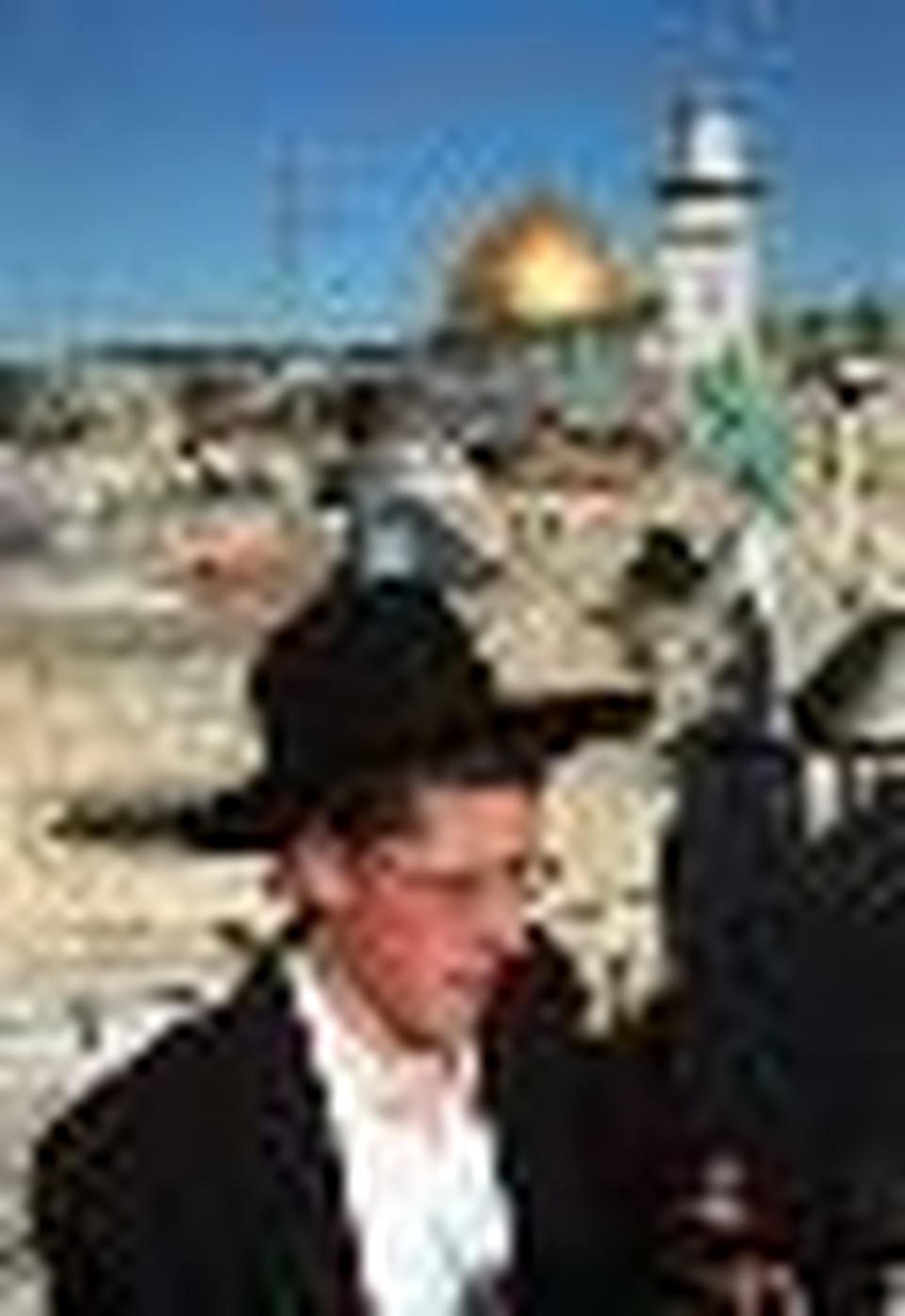Holy War for the Promised Land: Jews, Arabs and Jerusalem

To call the Jewish migration to the Lord’s land “the greatest crime of the twentieth century,” as the Arabs have generally done, ignores the history of humanity over the past one hundred years. Mass migrations have taken place all over the globe. Large-scale refugee flights have also occurred in many places, especially in Asia and Africa. For example, the 1980s Afghan refugee exodus of several million Muslims was considerably larger than the Palestinian flight, yet little was heard about it. The Palestinian flight was not even in the twentieth century’s top ten in terms of overall size.
National boundaries in Europe, Africa, and much of Asia were either created or redrawn many times during the 1900s, usually as a result of war.
The Arabs, like other peoples, were promised an independent state or states by the victorious European powers who helped liberate them from Ottoman control during World War I. They now have not one but seventeen states stretching from the west coast of Africa to Iran.
After centuries of oppression and persecution in Muslim and Christian regions, the Jews were also promised a national home in the Middle East, a proposition essentially agreed to by Arab-Muslim leader Faisal Hussein and endorsed by the League of Nations and later by the United Nations. While many Jews did not see the need for such a state in the early 1900s, almost all did so after the fires of the Holocaust were finally put out.
Jews immigrating to their ancient ancestral homeland did not “steal Arab land” as is so often charged, but legally bought what they could, as Arieh Avneri fully documents in his book Claim of Dispossession. It is true that much Arab-owned property was seized by Israeli authorities in 1948 and 1949. Many abandoned villages, usually partially destroyed, were either completely razed or rebuilt for Jewish settlement. Palestinians understandably reacted with much anger and bitterness when they learned, in many cases, that their homes either no longer existed or were being occupied by Jews.
Historical Context
But the Israeli land seizures must be placed in their historical context. This is usually not done by Palestinians and their advocates. It was the Arabs who initiated a self-declared total war of destruction against the fledgling Jewish state after turning down the U.N. partition plan and refusing, as is generally still true today, to recognize that the Jews might have a legitimate right, and certainly a need, for a sovereign state in their beloved Holy Land. If the Arabs had agreed to a land partition, there would have been no war, no refugees, and no land seizures. Socialist and Western-orientated Jewish leaders like David Ben Gurion — keenly aware that world support was vital for the new state — were not about to initiate military action to drive Palestinians from their homes and farms.
It was in the midst of the 1948 and 1967 wars, waged by a number of Arab countries against the vastly outnumbered Jews, that Palestinian land was seized. Unpleasant as it may be, land is often taken by victors in war, especially if the other side initiated the conflict and threatens to do so again in the future. The United States did not expand by land purchases alone, nor has any other nation in recorded history.
It is also important to remember that Jewish properties and other assets were seized all over Europe before and during World War II and from parts of the Arab world as Jews fled to the newly established state of Israel. Plundered Jewish wealth in Arab lands has never been compensated for, although West Germany paid war reparations to most holocaust survivors. Other countries like Switzerland and Sweden are only beginning to admit that they benefited economically from stolen Jewish assets.
The more than one hundred thousand Jews who fled Baghdad in the early 1950s were allowed to carry only one small suitcase with them and could take out of the country no more than the equivalent of 140 American dollars. The Iraqi government seized all of the remaining Jewish assets, which were substantial. The Jews of Europe and parts of the Arab world lost their property and valuables because of unprovoked attacks upon them, or they were forced to give them up in order to buy safe passage from hostile Arab lands. In contrast, Palestinian refugees lost their assets in the course of wars initiated by their own leaders and surrounding Arab states.
Understanding the Palestinian Plight
Yet even if one accepts the Jewish people’s biblical right, or at least practical need, to return to the Promised Land, the pictures and stories of suffering Palestinians grip the heart and mind. I have witnessed Palestinian agony firsthand. Many are my neighbors, my business contacts, my friends. I have visited their war-ravaged camps in Lebanon and watched them battle Israeli soldiers patrolling crowded camps in the West Bank and Gaza Strip. I have interviewed local Palestinian leaders and regularly read translations of their East Jerusalem–based newspapers. The Palestinians are not just statistics or “terrorists,” but flesh-and-blood people who have legitimate needs and desires like anyone else. Many of them have poured out their problems and feelings to me, and I have listened with an open heart. A person would have to be extremely callous not to realize that these people are really hurting.
The Palestinian Arabs are victims — but not primarily of the Israelis. They are, in my opinion, mainly the victims of an often-violent religion based on a corruption of the Bible. While I have great love and respect for the Muslims as people made in the image of God, I grieve for them as prisoners of a religious system, based on the Koran and Hadith, that exalts warfare and almost mandates hatred, or at least scorn, of the Jews. Of course, many Muslims — Palestinian and otherwise — are basically fine people who shun violence. But this is in spite of what their holy book and oral tradition teaches, not because of it. Many Palestinian Christians also disdain the Jewish people and Judaism, based on selected biblical passages and church tradition. But at least they have no scriptural basis — unlike Muslims — to wage war against Jews.
It was Haj Amin Husseini’s use of Islamic motifs that cemented Palestinian Arab opposition to the emerging Jewish state in the 1920s and 1930s. And Islamic teachings, above all else, inspired the entire Arab world to wage or support wars of annihilation against the Jewish state in 1948, 1967, and 1973. Saddam also used them as the basis for his Scud missile attacks in 1991. Although many PLO founders were Marxists or atheists, deeply rooted religious prejudices against the Jews were clearly reflected in the PLO’s founding charter, as they were in the 1988 HAMAS charter.
If Islam’s supreme prophet Muhammad personally killed Jews, as most Palestinian Muslims believe, then what were they to do to the Jewish “infidels” who were building a nation in the midst of the Arab-Muslim world, and who subsequently captured some of their holy sites during the 1967 war? Such actions seemed to contradict Islam’s Allah-ordained role as conqueror and ruler of the entire Middle East, and eventually of the entire world.
Many Muslims have a hard enough time accepting that Christian shrines are allowed to exist in the Holy Land, since Christians follow the “abominable” practice of worshiping Jesus. How then can they ever accept the fact that the doubly rejected Jews now control the Old City of Jerusalem, where Muhammad is said to have ascended into heaven from the Temple Mount? This reality seems to call into question the validity and truthfulness of Islam itself.
The Temple Mount is not Judaism’s third most holy site, as it is Islam’s (actually several other locations share “third place” with the Jerusalem site). I have often observed Muslims saying midday prayers near my home south of the Old City. I note that they always face away from the Temple Mount, which I can clearly see behind them. The Muslims are praying toward Islam’s most holy site, the Kaaba Shrine in Mecca, Saudi Arabia. But religious Jews pray facing toward the Temple Mount, which is far and away Judaism’s most holy site.
The Holy Mount
Many people think that the Western Wall is Judaism’s most sacred site, but it is the Mount itself that is holy to praying Jews. They gather at the Wall to pray that God will soon reveal the chosen Messiah and allow the construction of the third Jewish temple on the sacred Mount. Then, they believe, the prophecies recorded in the Books of Isaiah and Micah will be fulfilled, that “in the last days, the mountain of the house of the LORD’S temple will be established as chief among the mountains,” with all nations and peoples streaming up to it (Isa. 2:2–3; Mic. 4:1–2). Until such a time, observant Jews are forbidden to walk around on the Mount lest they accidentally tread over, and thus desecrate, the site of the ancient Holy of Holies.
Just as no Arab leader could ever agree to recognize permanent Jewish control over the Mount’s holy mosques, so no Israeli leader could ever voluntarily concede Jewish sovereignty over the spot that has been at the center of Jewish hearts for three thousand years. (Although Ehud Barak came close to doing this at Camp David in 2000, the Knesset would probably not have sanctioned such a controversial concession). If Yitzhak Rabin was assassinated for agreeing to withdraw from Hebron and other sites less holy than Jerusalem, what would happen to an Israeli leader who willingly abandoned the sacred Temple Mount? While a majority of Israeli Jews might agree to an arrangement under which Islam is guaranteed permanent control over the Mount itself, many Orthodox Jews and Israeli nationalists would strongly resist such a move, probably violently.
Indeed, the struggle for control of the Temple Mount and the rest of the Old City is the central point of contention in the Arab-Israeli conflict — a fact often obscured in the day-to-day media coverage of the latest happenings in the conflict. Islam — the world’s fastest-growing religion with well over 1 billion followers — will never willingly accept permanent Jewish sovereignty over any portion of “sacred Al-Quds,” and especially over the Temple Mount and adjacent Muslim areas of the Old City. Just as clearly, Israeli Jews will never willingly abandon control over most of the Old City, and especially over the Western Wall and Temple Mount.
Of course, many Israeli Jews couldn’t care less about holding on to the Temple Mount for religious reasons. Either they view Judaism in a more universal sense — no longer needing a “sacred spot”—or they are not religious at all. But even for many such people, the Mount seems to be a powerful and important, although frequently subconscious, symbol of their national and personal identity. This is undoubtedly the main reason why opinion polls show that an Israeli pullout from the eastern half of Jerusalem, and especially from the entire Old City, is considered unthinkable.
During my many years in Israel, I have yet to come across a peace proposal that contains a workable solution to the intensely emotional holy war being waged by both Muslims and Jews over the ancient Old City of Jerusalem. The Muslim world, still bristling with deep humiliation over the loss of the area in 1967, wants a total end to Israeli sovereignty — period. This view is shared by moderate, pro-Western countries like Egypt and Morocco and by more radical states like Syria, Libya, Iraq, and Iran with the latter states demanding that Jewish control be eliminated not only over all of Jerusalem but over all of Israel.
Orthodox Jews, remembering that they were completely barred from even approaching the gates of the walled Old City from 1948 until 1967, believe that continued access to the Western Wall will be assured only if their government retains absolute control of the area. Many are prepared to fight, if they must, to retain such control.
Another major obstacle to a peaceful solution of the Arab-Israeli conflict is deep Israeli suspicion that nobody really cares whether or not Israel survives as a distinct nation, let alone has access to Jerusalem’s Old City. In fact, Israeli friends tell me they suspect that many non-Jews would be quite happy if a violent “final solution” led to their demise as a nation.
Excerpted from "Holy War for the Promised Land: Israel at the Crossroads" by David Dolan. Copyright © 2003, David Dolan. ISBN 0-8054-2718-X Published by Broadman & Holman Publishers. Used by permission. Unauthorized duplication prohibited.
Originally published May 07, 2003.








